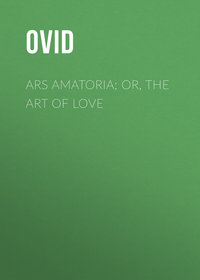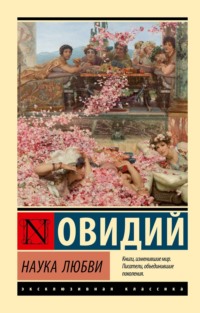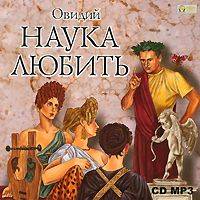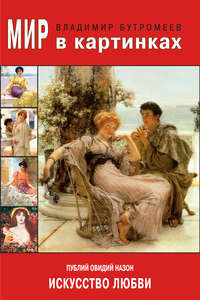 полная версия
полная версияThe Amores; or, Amours
If your beauty gives you a sway not too great over all things, face born to fascinate my eyes, still, you ought not, on that account, to despise me comparatively with yourself. That which is inferior must be united with what is great. The Nymph Calypso, seized with passion for a mortal, is believed to have detained the hero against his will. It is believed that the ocean-daughter of Nereus was united to the king of Plithia, 474 and that Egeria was to the just Numa: that Venus was to Vulcan: although, his anvil 475 left, he limped with a distorted foot. This same kind of verse is unequal; but still the heroic is becomingly united 476 with the shorter measure.
You, too, my life, receive me upon any terms. May it become you to impose conditions in the midst of your caresses. I will be no disgrace to you, nor one for you to rejoice at my removal. This affection will not be one to be disavowed by you. 477 May my cheerful lines be to you in place of great wealth: even many a fair wishes to gain fame through me. I know of one who publishes it that she is Corinna. 478 What would she not be ready to give to be so? But neither do the cool Eurotas, and the poplar-bearing Padus, far asunder, roll along the same banks; nor shall any one but yourself be celebrated in my poems. You, alone, shall afford subject-matter for my genius.
ELEGY XVIII
He tells Macer that he ought to write on Love.
While thou art tracing thy poem onwards 479 to the wrath of Achilles, and art giving their first arms to the heroes, after taking the oaths; I, Macer, 480 am reposing in the shade of Venus, unused to toil; and tender Love attacks me, when about to attempt a mighty subject. Many a time have I said to my mistress, "At length, away with you:" and forthwith she has seated herself in my lap. Many a time have I said, "I am ashamed of myself:" when, with difficulty, her tears repressed, she has said, "Ah wretched me! Now you are ashamed to love." And then she has thrown her arms around my neck: and has given me a thousand kisses, which quite overpowered me. I am overcome: and my genius is called away from the arms it has assumed; and I forthwith sing the exploits of my home, and my own warfare.
Still did I wield the sceptre: and by my care my Tragedy grew apace; 481 and for this pursuit I was well prepared. Love smiled both at my tragic pall, and my coloured buskins, and the sceptre wielded so well by a private hand. From this pursuit, too, did the influence of my cruel mistress draw me away, and Love triumphed over the Poet with his buskins. As I am allowed to do, either I teach the art of tender love, (alas! by my own precepts am I myself tormented:) or I write what was delivered to Ulysses in the words of Penelope, or thy tears, deserted Phyllis. What, too, Paris and Macareus, and the ungrateful Jason, and the parent of Hip-polytus, and Hippolytus himself read: and what the wretched Dido says, brandishing the drawn sword, and what the Lesbian mistress of the Æolian lyre.
How swiftly did my friend, Sabinus, return 482 from all quarters of the world, and bring back letters 483 from different spots! The fair Penelope recognized the seal of Ulysses: the stepmother read what was written by her own Hippolytus. Then did the dutiful Æneas write an answer to the afflicted Elissa; and Phyllis, if she only survives, has something to read. The sad letter came to Hypsipyle from Jason: the Lesbian damsel, beloved by Apollo, may give the lyre that she has vowed to Phoebus. 484 Nor, Macer, so far as it is safe for a poet who sings of wars, is beauteous Love unsung of by thee, in the midst of warfare. Both Paris is there, and the adultress, the far-famed cause of guilt: and Laodamia, who attends her husband in death. If well I know thee; thou singest not of wars with greater pleasure than these; and from thy own camp thou comest back to mine.
ELEGY XIX
He tells a husband who does not care for his wife to watch her a little more carefully.
If, fool, thou dost not need the fair to be well watched; still have her watched for my sake: that I may be pleased with her the more. What one may have is worthless; what one may not have, gives the more edge to the desires. If a man falls in love with that which another permits him to love, he is a man without feeling. Let us that love, both hope and fear in equal degree; and let an occasional repulse make room for our desires.
Why should I think of Fortune, should she never care to deceive me? I value nothing that does not sometimes cause me pain. The clever Corinna saw this failing in me; and she cunningly found out the means by which I might be enthralled. Oh, how many a time, feigning a pain in her head 485 that was quite well, has she ordered me, as I lingered with tardy foot, to take my departure! Oh, how many a time has she feigned a fault, and guilty herself, has made there to be an appearance of innocence, just as she pleased! When thus she had tormented me and had rekindled the languid flame, again was she kind and obliging to my wishes. What caresses, what delightful words did she have ready for me! What kisses, ye great Gods, and how many, used she to give me!
You, too, who have so lately ravished my eyes, often stand in dread of treachery, often, when entreated, refuse; and let me, lying prostrate on the threshold before your door-posts, endure the prolonged cold throughout the frosty night. Thus is my love made lasting, and it grows up in lengthened experience; this is for my advantage, this forms food for my affection. A surfeit of love, 486 and facilities too great, become a cause of weariness to me, just as sweet food cloys the appetite. If the brazen tower had never enclosed Danaë, 487 Danaë had never been made a mother by Jove. While Juno is watching Io 'with her curving horns, she becomes still more pleasing to Jove than she has been before.
Whoever desires what he may have, and what is easily obtained, let him pluck leaves from the trees, and take water from the ample stream. If any damsel wishes long to hold her sway, let her play with her lover. Alas! that I, myself, am tormented through my own advice. Let constant indulgence be the lot of whom it may, it does injury to me: that which pursues, from it I fly; that which flies, I ever pursue. But do thou, too sure of the beauteous fair, begin now at nightfall to close thy house. Begin to enquire who it is that so often stealthily paces thy threshold? Why, too, the dogs bark 488 in the silent night. Whither the careful handmaid is carrying, or whence bringing back, the tablets? Why so oft she lies in her couch apart? Let this anxiety sometimes gnaw into thy very marrow; and give some scope and some opportunity for my stratagems.
If one could fall in love with the wife of a fool, that man could rob the barren sea-shore of its sand. And now I give thee notice; unless thou begin to watch this fair, she shall begin to cease to be a flame of mine. I have put up with much, and that for a long time; I have often hoped that it would come to pass, that I should adroitly deceive thee, when thou hadst watched her well. Thou art careless, and dost endure what should be endured by no husband; but an end there shall be of an amour that is allowed to me. And shall I then, to my sorrow, forsooth, never be forbidden admission? Will it ever be night for me, with no one for an avenger? Am I to dread nothing? Shall I heave no sighs in my sleep? What have I to do with one so easy, what with such a pander of a husband? By thy own faultiness thou dost mar my joys. Why, then, dost thou not choose some one else, for so great long-suffering to please? If it pleases thee for me to be thy rival, forbid me to be so.–
BOOK THE THIRD
ELEGY I
The Poet deliberates whether he shall continue to write Elegies, or whether he shall turn to Tragedy.
There stands an ancient grove, and one uncut for many a year; 'tis worthy of belief that a Deity inhabits that spot. In the midst there is a holy spring, and a grotto arched with pumice; and on every side the birds pour forth their sweet complaints. Here, as I was walking, protected by the shade of the trees, I was considering upon what work my Muse should commence. Elegy came up, having her perfumed hair wreathed; and, if I mistake not, one of her feet was longer than the other. 501 Her figure was beauteous; her robe of the humblest texture, her garb that of one in love; the fault of her foot was one cause of her gracefulness.
Ruthless Tragedy, too, came with her mighty stride; on her scowling brow were her locks; her pall swept the ground. Her left hand held aloft the royal sceptre; the Lydian buskin 502 was the high sandal for her feet. And first she spoke; "And when will there be an end of thy loving? O Poet, so slow at thy subject matter! Drunken revels 503 tell of thy wanton course of life; the cross roads, as they divide in their many ways, tell of it. Many a time does a person point with his finger at the Poet as he goes along, and say, 'That, that is the man whom cruel Love torments.' Thou art talked of as the story of the whole City, and yet thou dost not perceive it; while, all shame laid aside, thou art boasting of thy feats. 'Twere time to be influenced, touched by a more mighty inspiration; 505 long enough hast thou delayed; commence a greater task. By thy subject thou dost cramp thy genius; sing of the exploits of heroes; then thou wilt say, 'This is the field that is worthy of my genius.' Thy Muse has sportively indited what the charming fair may sing; and thy early youth has been passed amidst its own numbers. Now may I, Roman Tragedy, gain a celebrity by thy means; thy conceptions will satisfy my requirements."
Thus far did she speak; and, supported on her tinted buskins, three or four times she shook her head with its flowing locks. The other one, if rightly I remember, smiled with eyes askance. Am I mistaken, or was there a branch of myrtle in her right hand? "Why, haughty Tragedy," said she, "dost thou attack me with high-sounding words? And canst thou never be other than severe? Still, thou thyself hast deigned to be excited in unequal numbers! 506 Against me hast thou strived, making use of my own verse. I should not compare heroic measures with my own; thy palaces quite overwhelm my humble abodes. I am a trifler; and with myself, Cupid, my care, is a trifler too; I am no more substantial myself than is my subject-matter. Without myself, the mother of wanton Love were coy; of that Goddess do I show myself the patroness 507 and the confidant. The door which thou with thy rigid buskin canst not unlock, the same is open to my caressing words. And yet I have deserved more power than thou, by putting up with many a thing that would not have been endured by thy haughtiness.
"Through me Corinna learned how, deceiving her keeper, to shake the constancy of the fastened door, 508 and to slip away from her couch, clad in a loose tunic, 509 and in the night to move her feet without a stumble. Or how often, cut in the wood, 510 have I been hanging up at her obdurate doors, not fearing to be read by the people as they passed! I remember besides, how, when sent, I have been concealed in the bosom of the handmaid, until the strict keeper had taken his departure. Still further—when thou didst send me as a present on her birthday 511 —but she tore me to pieces, and barbarously threw me in the water close by. I was the first to cause the prospering germs of thy genius to shoot; it has, as my gift, that for which she is now asking thee."
They had now ceased; on which I began: "By your own selves, I conjure you both; let my words, as I tremble, be received by unprejudiced ears. Thou, the one, dost grace me with the sceptre and the lofty buskin; already, even by thy contact with my lips, have I spoken in mighty accents. Thou, the other, dost offer a lasting fame to my loves; be propitious, then, and with the long lines unite the short.
"Do, Tragedy, grant a little respite to the Poet. Thou art an everlasting task; the time which she demands is but short." Moved by my entreaties, she gave me leave; let tender Love be sketched with hurried hand, while still there is time; from behind 514 a more weighty undertaking presses on.
ELEGY II
To his mistress, in whose company he is present at the chariot races in the Circus Maximus. He describes the race.
I am not sitting here 515 an admirer of the spirited steeds; 516 still I pray that he who is your favourite may win. I have come here to chat with you, and to be seated by you, 517 that the passion which yea cause may not be unknown to you. You are looking at the race, I am looking at you; let us each look at what pleases us, and so let us each feast our eyes. O, happy the driver 518 of the steeds, whoever he is, that is your favourite; it is then his lot to be the object of your care; might such be my lot; with ardent zeal to be borne along would I press over the steeds as they start from the sacred barrier. 519 And now I would give rein; 520 now with my whip would I lash their backs; now with my inside wheel would I graze the turning-place. 521 If you should be seen by me in my course, then I should stop; and the reins, let go, would fall from my hands.
Ah! how nearly was Pelops 522 falling by the lance of him of Pisa, while, Hippodamia, he was gazing on thy face! Still did he prove the conqueror through the favour of his mistress; 523 let us each prove victor through the favour of his charmer. Why do you shrink away in vain? 524 The partition forces us to sit close; the Circus has this advantage 525 in the arrangement of its space. But do you 526 on the right hand, whoever you are, be accommodating to the fair; she is being hurt by the pressure of your side. And you as well, 527 who are looking on behind us; draw in your legs, if you have any decency, and don't press her back with your hard knees. But your mantle, hanging too low, is dragging on the ground; gather it up; or see, I am taking it up 528 in my hands. A disobliging garment you are, who are thus concealing ancles so pretty; and the more you gaze upon them, the more disobliging garment you are. Such were the ancles of the fleet Atalanta, 529 which Milanion longed to touch with his hands. Such are painted the ancles of the swift Diana, when, herself still bolder, she pursues the bold beasts of prey. On not seeing them, I am on fire; what would be the consequence if they were seen? You are heaping flames upon flames, water upon the sea. From them I suspect that the rest may prove charming, which is so well hidden, concealed beneath the thin dress.
But, meanwhile, should you like to receive the gentle breeze which the fan may cause, 530 when waved by my hand? Or is the heat I feel, rather that of my own passion, and not of the weather, and is the love of the fair burning my inflamed breast? While I am talking, your white clothes are sprinkled with the black dust; nasty dust, away from a body like the snow.
But now the procession 531 is approaching; give good omens both in words and feelings. The time is come to applaud; the procession approaches, glistening with gold. First in place is Victory borne 532 with expanded wings; 533 come hither, Goddess, and grant that this passion of mine may prove victorious.
"Salute Neptune, 534 you who put too much confidence in the waves; I have nought to do with the sea; my own dry land engages me. Soldier, salute thy own Mars; arms I detest 535 Peace delights me, and Love found in the midst of Peace. Let Phoebus be propitious to the augurs, Phoebe to the huntsmen; turn, Minerva, towards thyself the hands of the artisan. 536 Ye husbandmen, arise in honour of Ceres and the youthful Bacchus; let the boxers 537 render Pollux, the horseman Castor propitious. Thee, genial Venus, and the Loves, the boys so potent with the bow, do I salute; be propitious, Goddess, to my aspirations. Inspire, too, kindly feelings in my new mistress; let her permit herself to be loved." She has assented; and with her nod she has given a favourable sign. What the Goddess has promised, I entreat yourself to promise. With the leave of Venus I will say it, you shall be the greater Goddess. By these many witnesses do I swear to you, and by this array of the Gods, that for all time you have been sighed for by me. But your legs have no support; you can, if perchance you like, rest the extremities of your feet in the lattice work. 538
Now the Prætor, 539 the Circus emptied, has sent from the even barriers 540 the chariots with their four steeds, the greatest sight of all. I see who is your favourite; whoever you wish well to, he will prove the conqueror. The very horses appear to understand what it is you wish for. Oh shocking! around the turning-place he goes with a circuit far too wide. 541 What art thou about? The next is overtaking thee with his wheel in contact. What, wretched man, art thou about? Thou art wasting the good wishes of the fair; pull in the reins, I entreat, to the left, 542 with a strong hand. We have been resting ourselves in a blockhead; but still, Romans, call him back again, 543 and by waving the garments, 544 give the signal on every side. See! they are calling him back; but that the waving of the garments may not disarrange your hair, 545 you may hide yourself quite down in my bosom.
And now, the barrier 546 unbarred once more, the side posts are open wide; with the horses at full speed the variegated throng 547 bursts forth. This time, at all events, 548 do prove victorious, and bound over the wide expanse; let my wishes, let those of my mistress, meet with success. The wishes of my mistress are fulfilled; my wishes still exist. He bears away the palm; 549 the palm is yet to be sought by me. She smiles, and she gives me a promise of something with her expressive eye. That is enough for this spot; grant the rest in another place.
ELEGY III
He complains of his mistress, whom he has found to be forsworn.
Go to, believe that the Gods exist; she who had sworn has broken her faith, and still her beauty remains 550 just as it was before. Not yet forsworn, flowing locks had she; after she has deceived the Gods, she has them just as long. Before, she was pale, having her fair complexion suffused with the blush of the rose; the blush is still beauteous on her complexion of snow. Her foot was small; still most diminutive is the size of that foot. Tall was she, and graceful; tall and graceful does she still remain. Expressive eyes had she, which shone like stars; many a time through them has the treacherous fair proved false to me. 551
Even the Gods, forsooth, for ever permit the fair to be forsworn, and beauty has its divine sway. 552 I remember that of late she swore both by her own eyes and by mine, and mine felt pain. 553 Tell me, ye Gods, if with impunity she has proved false to you, why have I suffered, punishment for the deserts of another? But the virgin daughter of Cepheus is no reproach, forsooth, to you, 554 who was commanded to die for her mother, so inopportunely beauteous. 'Tis not enough that I had you for witnesses to no purpose; unpunished, she laughs at even the Gods together with myself; that by my punishment she may atone for her perjuries, am I, the deceived, to be the victim of the deceiver? Either a Divinity is a name without reality, and he is revered in vain, and influences people with a silly credulity; or else, if there is any God, he is fond of the charming fair, and gives them alone too much licence to be able to do any thing.
Against us Mavors is girded with the fatal sword; against us the lance is directed by the invincible hand of Pallas; against us the flexible bow of Apollo is bent; against us the lofty right hand of Jove wields the lightnings. The offended Gods of heaven fear to hurt the fair; and they spontaneously dread those who dread them not. And who, then, would take care to place the frankincense in his devotion upon the altars? At least, there ought to be more spirit in men. Jupiter, with his fires, hurls at the groves 555 and the towers, and yet he forbids his weapons, thus darted, to strike the perjured female. Many a one has deserved to be struck. The unfortunate Semele 556 perished by the flames; that punishment was found for her by her own compliant disposition. But if she had betaken herself off, on the approach of her lover, his father would not have had for Bacchus the duties of a mother to perform.
Why do I complain, and why blame all the heavens? The Gods have eyes as well as we; the Gods have hearts as well. Were I a Divinity myself, I would allow a woman with impunity to swear falsely by my Godhead. I myself would swear that the fair ever swear the truth; and I would not be pronounced one of the morose Divinities. Still, do you, fair one, use their favour with more moderation, or, at least, do have some regard 557 for my eyes.
ELEGY IV
He tells a jealous husband, who watches his wife, that the greater his precautions, the greater are the temptations to sin.
Cruel husband, by setting a guard over the charming fair, thou dost avail nothing; by her own feelings must each be kept. If, all apprehensions removed, any woman is chaste, she, in fact, is chaste; she who sins not, because she cannot, still sins. 558 However well you may have guarded the person, the mind is still unchaste; and, unless it chooses, it cannot be constrained. You cannot confine the mind, should you lock up every thing; when all is closed, the unchaste one will be within. The one who can sin, errs less frequently; the very opportunity makes the impulse to wantonness to be the less powerful. Be persuaded by me, and leave off instigating to criminality by constraint; by indulgence thou mayst restrain it much more effectually.
I have sometimes seen the horse, struggling against his reins, rush on like lightning with his resisting mouth. Soon as ever he felt that rein was given, he stopped, and the loosened bridle lay upon his flowing mane. We are ever striving for what is forbidden, and are desiring what is denied us; even so does the sick man hanker after the water that is forbidden him. Argus used to carry a hundred eyes in his forehead, a hundred in his neck; 559 and these Love alone many a time evaded. Danaë, who, a maid, had been placed in the chamber which was to last for ever with its stone and its iron, 560 became a mother. Penelope, although she was without a keeper, amid so many youthful suitors, remained undefiled.
Whatever is hoarded up, we long for it the more, and the very pains invite the thief; few care for what another giants.
Not through her beauty is she captivating, but through the fondness of her husband; people suppose it to be something unusual which has so captivated thee. Suppose she is not chaste whom her husband is guarding, but faithless; she is beloved; but this apprehension itself causes her value, rather than her beauty. Be indignant if thou dost please; forbidden pleasures delight me: if any woman can only say, "I am afraid, that woman alone pleases me. Nor yet is it legal 561 to confine a free-born woman; let these fears harass the bodies of those from foreign parts. That the keeper, forsooth, may be able to say, 'I caused it she must be chaste for the credit of thy slave. He is too much of a churl whom a faithless wife injures, and is not sufficiently acquainted with the ways of the City; in which Romulus, the son of Ilia, and Remus, the son of Ilia, both begotten by Mars, were not born without a crime being committed. Why didst thou choose a beauty for thyself, if she was not pleasing unless chaste? Those two qualities 562 cannot by any means be united.'"
If thou art wise, show indulgence to thy spouse, and lay aside thy morose looks; and assert not the rights of a severe husband. Show courtesy, too, to the friends thy wife shall find thee, and many a one will she find. 'Tis thus that great credit accrues at a very small outlay of labour. Thus wilt thou be able always to take part in the festivities of the young men, and to see many a thing at home, 563 which you have not presented to her.
ELEGY V
A vision, and its explanation.
Twas night, and sleep weighed down my wearied eyes. Such a vision as this terrified my mind.









